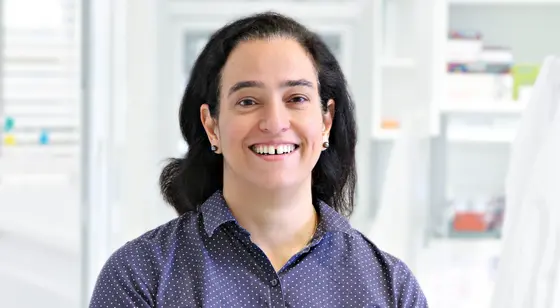The “Friends of the German Cancer Research Center“ association supports the DKFZ and aims to help strengthen its position in international competition. With the newly established DKFZ Innovation Award, the association aims to honor researchers whose highly innovative work bridges the gap between basic research and practical application with commercialization potential.
The jury awarded the prize, which was presented for the first time this year, to Nina Papavasiliou. The DKFZ immunologist received the €25,000 award for developing an immunization system that can be used to generate protective, so-called neutralizing antibodies against virtually any foreign molecule.
“Nina Papavasiliou had the extraordinary idea of using her research results to solve a completely different problem. Science that can be directly applied in practice and can help improve people's health - this application convinced us,“ says Ulrike Thümmel, the first chairwoman of the ‚Friends of the DKFZ Association'.
Michael Baumann, Chairman of the DKFZ Board, comments: Our research at DKFZ is consistently translational. This means that we examine all results for their usability and, wherever possible, we encourage our scientists to engage in commercial exploitation. Only in this way can scientific progress rapidly benefit patients. Nina Papavasiliou's immunization system is an excellent example of successful translation.“
The surprising idea behind Papavasiliou's invention: She uses African trypanosomes, single-celled parasites known to cause human sleeping sickness and severe livestock diseases. The trypanosomes live in the bloodstream and must therefore protect themselves well against antibody attacks. Their surface is covered with many millions of identical proteins, called VSG, which stimulate the immune system to produce large amounts of neutralizing antibodies. However, as soon as the antibody response is triggered, the parasite abruptly exchanges all the VSGs on its surface for a new, modified version - so the immune system is always lagging behind in a real trypanosome infection.
Even if the parasite ultimately tricks human immune defenses, Papavasiliou and colleagues realized that the highly immunogenic densely packed VSGs are an excellent carrier to induce antibodies against almost any molecule. For this purpose they use killed trypanosomes whose membranes form microscopic vesicles after ultrasound treatment, and which remain densely packed with VSG just like the intact pathogen. An enzymatic process is used to couple the desired vaccine antigen to the “tips“ of the VSG. After vaccination, which does not even require enhancers (adjuvants), the body produces large amounts of neutralizing antibodies against the coupled antigen.
“With this system, we manage to induce antibody responses even against “difficult“ antigens,“ explains immunologist Papavasiliou. “For example, standard immunization methods cannot generate antibodies against small chemical molecules, such as pharmaceutical agents.“ Using the trypanosome immunization system, she and colleagues have already succeeded in generating antibodies against the opioid fentanyl. Fentanyl abuse and addiction is widespread in the U.S., resulting in numerous deaths. “Our idea is to vaccinate against fentanyl to produce neutralizing antibodies that render the drug harmless. In this way we prevent intoxication and block overdose,“ says Papavasiliou.
If the principle sounds simple, more than a decade of development went into Papavasiliou's immunization system. “I am grateful that the Friends of the DKFZ Association, with this prize, also recognizes the effort required to bring an idea to market. Unfortunately, scientists very rarely receive support for this type of development work,“ says the award winner.
Papavasiliou has already contributed her developments to two start-up companies. U.S.-based Hepione Therapeutics are further developing the fentanyl vaccine. The German company Pansome GmbH, in which the DKFZ also holds a stake, plans to use the trypanosome system to produce customized vaccines and antibodies for other biotech companies.
Biologist Nina Papavasiliou received her PhD from Rockefeller University in New York in 1998, where she headed an immunology research department until 2015. Since 2016, the U.S. American has headed the Immune University Division at the German Cancer Research Center. For her outstanding research achievements, Nina Papavasiliou was appointed this year as a member of the European Molecular Biology Organisation (EMBO).
A portrait photo of Nina Papavasiliou is available for download:
Papavasiliou.jpg
Note on use of images related to press releases
Use is free of charge. The German Cancer Research Center (Deutsches Krebsforschungszentrum, DKFZ) permits one-time use in the context of reporting about the topic covered in the press release. Images have to be cited as follows: “Source: Jutta Jung, DKFZ“.
Distribution of images to third parties is not permitted unless prior consent has been obtained from DKFZ's Press Office (phone: ++49-(0)6221 42 2854, E-mail: presse@dkfz.de). Any commercial use is prohibited.



